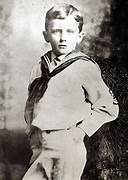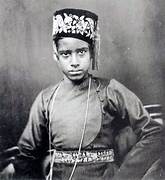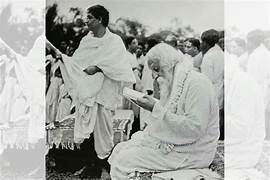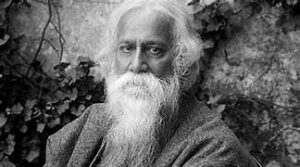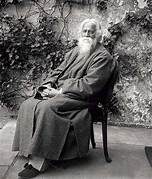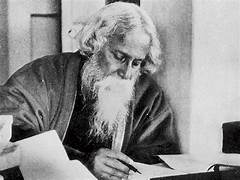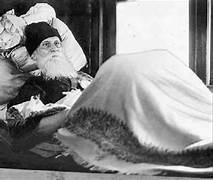Indian poet, philosopher, musician, artist, and polymath Rabindranath Tagore (1861–1941) was known for his Bengali writings. He is perhaps best known as the author of “Gitanjali,”. A collection of poems that earned him the Nobel Prize in Literature in 1913. Making him the first Asian to win a Nobel Prize. Tagore’s works spanned various genres, including poetry, short stories, novels, plays, and essays, and his literary contributions have had a profound impact on both Indian and world literature.
His poetry frequently addressed issues of human relationships, spirituality. The natural world, and the intricate interactions that exist between the individual and society. With a strong foundation in his Bengali background. Tagore wrote about societal issues, supported cultural rebirth, and encouraged harmony and unity amongst many ethnicities.
Tagore was not only a prolific writer but also a social reformer and educator. In order to combine the best aspects of Indian and Western educational systems and emphasize the importance of creativity and the natural world in education. He built the avant-garde school Visva-Bharatiniversity in Santiniketan, West Bengal.
Tagore was also a musician and composer, composing the lyrics and melody for “Jana Gana Mana,” India’s national song. He was a talented painter and graphic artist who also created the Visva-Bharati University insignia.
In addition to his Nobel Prize, Rabindranath Tagore’s legacy includes his significant role in India’s struggle for independence. His contributions to international understanding and cultural interchange, as well as his long-lasting impact on Indian and global literature, arts, and education.
Rabindranath Tagore Early Life:
Rabindranath Tagore, a multifaceted genius and the first non-European Nobel laureate in Literature, was born on May 7, 1861, in Calcutta, British India (present-day Kolkata, India). He came from a well-known Bengali family that was very important to the local community’s social and cultural life. An unusual upbringing and exposure to a vibrant cultural environment characterized Tagore’s early years. Being the youngest of thirteen children, he experienced profound psychological effects at an early age when his mother passed away. Despite being born into a privileged family. The socioeconomic and political changes of Tagore’s boyhood had a profound effect on him. Such as the Bengal Renaissance and the Indian struggle for independence.
Tagore’s early education was eclectic, blending traditional Indian learning with Western influences. He was knowledgeable about several languages, books, and artistic mediums. His father, Debendranath Tagore, was a philosopher and a leader of the Brahmo Samaj, a reformist religious and social movement. The family’s estate, known as the “Jorasanko Thakur Bari,”. Became a hub for cultural and intellectual activities, exposing young Rabindranath to a diverse range of ideas.
By the age of eight, Tagore began composing poems, and his literary journey took off. Disillusioned with the traditional educational system, he returned from his formal schooling in England without finishing his degree. Early family and educational traumas set the groundwork for Tagore’s subsequent pursuits as a playwright, poet, philosopher, musician, and artist. His closeness to his roots, combined with a global viewpoint, created the visionary and universal aspect of his later works. Making Rabindranath Tagore a towering figure in the world of literature and culture.
Rabindranath Tagore Education:
Rabindranath Tagore, a polymath from India, was a prominent poet, philosopher, musician, and artist who reshaped the cultural and intellectual landscape of the country in the late 19th and early 20th centuries. Born on May 7, 1861, in Calcutta (now Kolkata). Tagore came from a distinguished Bengali family with a rich cultural and educational background.
Tagore’s education was unconventional for his time. He started his formal education at a public school in Brighton, England, but he didn’t like the strict British curriculum. Subsequently, he returned to India without completing his studies in England. Based on the idea of holistic learning—which encouraged development of the mind, body, and spirit—Tagore developed his educational philosophy.
In 1901, Tagore founded the experimental school, Santiniketan, in rural Bengal. The school, later expanded into Visva-Bharati University, aimed to provide a more open and creative environment for learning. Tagore’s educational philosophy at Santiniketan emphasized the importance of nature, arts, and a personalized approach to learning. He believed in fostering creativity, critical thinking, and a harmonious connection between the individual and the community.
Tagore’s educational vision extended beyond the conventional classroom setting. He advocated for a global outlook, promoting the idea that education should transcend national boundaries and foster a sense of unity among diverse cultures. Tagore received the Nobel Prize in Literature in 1913 for his collection of poems. “Gitanjali,” making him the first non-European to be awarded a Nobel Prize in Literature.
Rabindranath Tagore’s contributions to education went beyond institutional reforms. They reflected a profound understanding of the human spirit and the interconnectedness of knowledge, arts, and nature. His legacy in the field of education continues to inspire educators worldwide.
Literary Achievements:
A literary giant, Rabindranath Tagore produced significant contributions that went well beyond the boundaries of his native India. Born in 1861, Tagore was not only a poet but also a playwright, novelist, philosopher, and musician. His literary accomplishments stand out for their depth and range. Tagore’s poetic works, including the collection “Gitanjali,” earned him the Nobel Prize in Literature in 1913, making him the first Asian to receive such an honor. His poetry, characterized by its lyrical beauty and spiritual insights, transcends cultural boundaries and continues to resonate with readers globally.
Tagore’s literary repertoire also includes an array of novels and short stories, with “The Home and the World” and “Gora” standing out as notable examples. Through these works, he explored themes of nationalism, identity, and the clash between tradition and modernity. One of Tagore’s most well-known plays is “The Post Office,” a drama that explores themes of life and death.
Beyond his written works, Tagore was a prolific composer and musician, having composed the music for the Indian national anthem, “Jana Gana Mana.” His multifaceted talents and ability to seamlessly integrate various art forms into his literary expressions underscore the breadth of his creative genius.
Rabindranath Tagore’s literary achievements not only left an indelible mark on Indian literature but also played a pivotal role in shaping the global literary landscape. His legacy endures as a source of inspiration for writers, poets, and thinkers around the world. His creations are still cherished today due to their enduring value and ubiquity.
Social Philosophy:
Rabindranath Tagore, the renowned Indian poet, philosopher, and polymath, had a profound and multifaceted social philosophy that encompassed a wide range of human experiences and values. At the core of Tagore’s social philosophy was the idea of unity in diversity and a harmonious coexistence of different cultures, religions, and communities. He believed in the interconnectedness of all humanity and emphasized the need for a universal humanism that transcended narrow parochialism.
Tagore was a strong advocate for the importance of education in fostering a deeper understanding among individuals from diverse backgrounds. He established the Visva-Bharati University as an institution that aimed to promote a holistic education that celebrated both the intellectual and spiritual dimensions of human life. Tagore believed that education might break down boundaries and lead to a more egalitarian society.
Another key aspect of Tagore’s social philosophy was his critique of nationalism. While he acknowledged the significance of love for one’s country. He cautioned against an excessive and narrow form of nationalism that could lead to intolerance and conflict. He envisioned a world where individuals could appreciate their own cultural heritage while respecting and appreciating the cultures of others.
Tagore’s emphasis on the importance of the arts in social life also played a crucial role in his philosophy. He believed that literature, music, and art had the power to transcend language barriers and communicate universal truths. Through his own literary and artistic works, Tagore sought to promote a sense of beauty, compassion, and shared humanity.
In conclusion, Rabindranath Tagore’s social philosophy was distinguished by an emphasis on humanistic principles. The promotion of education as a means of fostering understanding, a critique of narrow nationalism. A belief in the transformative power of the arts to create a more harmonious and interconnected world.
Rabindranath Tagore Gitanjali:
“Gitanjali,” meaning “Song Offerings,” is a collection of poems written by the renowned Indian poet Rabindranath Tagore. It was published in 1910 and earned Tagore the Nobel Prize in Literature in 1913. The collection is a profound and spiritual exploration that delves into themes of divine love, the human connection with the divine, and the eternal quest for truth.
Tagore’s “Gitanjali” reflects his deep contemplation on the nature of existence, the divine, and the human soul. The poems are imbued with a sense of mysticism and a universal appeal that transcends cultural boundaries. The verses are lyrical and evoke a sense of spiritual awakening, with Tagore expressing his profound thoughts on life, love, and the divine in a beautifully poetic manner.
The poet frequently employs nature imagery, relying on the beauty of nature to convey profound philosophical and spiritual truths. The verses in “Gitanjali” are characterized by their simplicity, yet they carry profound insights into the complexities of the human experience and the cosmic order.
Overall, “Gitanjali” is a timeless work that continues to resonate with readers worldwide, inviting them to reflect on the deeper aspects of life, spirituality, and the enduring connection between humanity and the divine.
Rabindranath Tagore Social:
Rabindranath Tagore, a towering presence in literature, music, and art, was both a poet and a deep social thinker. Tagore, who was born in Bengal, India, in 1861, wrote on societal difficulties and his vision of a peaceful society. He believed in the intrinsic worth of every individual and championed the cause of universal humanism. Tagore’s social philosophy emphasized the importance of education in fostering enlightenment and breaking down barriers of ignorance. His concept of “Vishwa Bharati,” an international university, aimed at promoting a global community where diverse cultures could coexist and learn from one another.
Tagore was a vocal critic of societal ills such as caste discrimination and advocated for gender equality. His literary creations, including the poem “Where the mind is without fear,” expressed his aspirations for a society free from narrow-mindedness and prejudice. Tagore’s efforts extended beyond his writing; he actively engaged in social reforms and established experimental schools that sought to impart holistic education. His work on social change earned him the Nobel Prize in Literature in 1913, making him the first non-European laureate.
In summary, Rabindranath Tagore’s social philosophy was rooted in a deep appreciation for human dignity, cultural exchange, and the transformative power of education. His influence extended far beyond his literary contributions, leaving an indelible mark on the social and cultural fabric of India and the world at large.
Political Views:
Rabindranath Tagore, the renowned Indian poet, philosopher, and polymath, had complex and nuanced political views that evolved over time. Tagore was initially a supporter of the Indian independence cause and an outspoken opponent of colonialism. However, as time progressed, his views diverged from mainstream political ideologies.
Tagore was critical of nationalism as he believed it could lead to narrow-mindedness and exclusion. He expressed concerns about the potential dangers of an overly zealous nationalism that might undermine the cultural and spiritual unity that he valued. This skepticism towards rigid nationalism is evident in his famous work, “Gitanjali,”. Where he emphasizes the universality of humanity beyond national boundaries.
Tagore was a strong advocate for cultural exchange and believed in fostering connections between different cultures and civilizations. He was not aligned with any particular political party and maintained a degree of independence in his political stance. Despite his initial support for the Indian independence movement. He became increasingly disillusioned with the direction it took, especially with the rise of religious and communal tensions.
Tagore’s political philosophy was deeply intertwined with his broader philosophical and spiritual outlook. He emphasized the importance of education, art, and spirituality in building a harmonious and just society. Tagore’s vision went beyond the conventional political frameworks of his time, focusing on the need for a holistic and humanistic approach to address the challenges facing society.
In summary, Rabindranath Tagore’s political views were characterized by a critical stance towards narrow nationalism. A concern for cultural exchange, and an emphasis on the spiritual and humanistic aspects of society. His legacy extends beyond the realm of politics, encompassing a broader vision for a world that embraces diversity and values the interconnectedness of humanity.
Cultural Exchange:
Rabindranath Tagore, a multifaceted genius and the first non-European Nobel laureate in Literature, played a pivotal role in fostering cultural exchange during the early 20th century. Born in 1861 in Bengal, India, Tagore was not only a poet but also a philosopher, musician, and painter. His extensive travels and interactions with intellectuals worldwide fueled a global cultural exchange. Tagore’s deep appreciation for diverse cultures and his commitment to humanism transcended national boundaries.
He founded the world-renowned Visva-Bharati University in Santiniketan, India, as a center for cultural exchange and collaboration, attracting scholars, artists, and students from across the globe. Tagore’s works, including his poems, songs, and plays, have been translated into numerous languages, contributing to a rich tapestry of global literature. Through his vision and creative pursuits, Tagore became a symbol of cultural unity, promoting mutual understanding and respect among nations. His legacy continues to inspire cultural exchange initiatives and collaborations that bridge gaps and celebrate the shared heritage of humanity.
Creative Outputs:
Rabindranath Tagore, the eminent Indian polymath, left an indelible mark on literature, music, art, and philosophy. His creative outputs span a vast and diverse range, showcasing his unparalleled genius. In the realm of literature, Tagore’s most celebrated work is “Gitanjali,”. A collection of poems that earned him the Nobel Prize in Literature in 1913. His poetic brilliance seamlessly blended mysticism, nature, and human emotions. Tagore was also a prolific playwright, penning timeless works such as “The Post Office” and “The Home and the World.”
Apart from his literary contributions, Tagore’s musical compositions, especially in the form of Rabindra Sangeet, have become an integral part of Bengali culture. His artistry extended beyond words and music, as he was a renowned painter and philosopher. Tagore’s thoughts on education and humanism are embodied in the establishment of Shantiniketan. An experimental educational institution that sought to foster holistic development. In essence, Rabindranath Tagore’s creative outputs constitute a rich tapestry that continues to inspire and resonate across cultures and disciplines.
Visva-Bharati University:
Visva-Bharati University, located in Santiniketan, West Bengal, India, was founded by the renowned poet, philosopher, and Nobel laureate Rabindranath Tagore. Established in 1921, Tagore envisioned Visva-Bharati as an institution that would embody the ideals of universalism, humanism, and a synthesis of Eastern and Western educational philosophies. The university’s name reflects its overarching goal of fostering a harmonious blend of knowledge encompassing the entire world.
Additionally to being a university, Visva-Bharati is a center of culture and knowledge that advances the concept of all-encompassing education. The campus, designed by Tagore himself, is known for its unique and open environment that encourages close interaction between students and teachers. The emphasis is not only on academic excellence but also on the development of a well-rounded individual with a deep understanding of humanity and culture.
The university offers a diverse range of courses, including humanities, social sciences, natural sciences, fine arts, and performing arts. It has several faculties and departments dedicated to various disciplines, each contributing to the holistic development of students.
One of the distinctive features of Visva-Bharati is its celebration of cultural events and festivals, which play a significant role in fostering a sense of community and shared identity among the students. The university is particularly known for its annual Poush Mela. A huge fair to celebrate the arrival of winter, and the Basanta Utsav, a colorful festival to welcome spring.
Over the years, Visva-Bharati University has maintained its commitment to Tagore’s vision of education as a means of fostering creativity, critical thinking, and a sense of responsibility towards society. It continues to attract students, scholars, and artists from around the world, making it a unique and vibrant institution in the landscape of higher education.
National Anthem:
Rabindranath Tagore composed the poem “Jana Gana Mana” in Bengali, which later became the national anthem of India. The poem was written in 1911 and first performed before the Indian National Congress’ Calcutta Session on December 27, 1911. Originally composed in Bengali, the poem was later translated into Hindi by Tagore himself. On January 24, 1950, the Indian government formally adopted “Jana Gana Mana” as the national anthem.
Tagore’s composition is a hymn to the universal spirit of humanity, celebrating the diverse cultures and regions of India. It reflects his vision of a united and harmonious nation, transcending linguistic and regional differences. The national anthem is a symbol of India’s unity in diversity and has been an integral part of national ceremonies and events, evoking a sense of patriotism and pride among the citizens of the country.
Artistic Expression:
Rabindranath Tagore, a polymath and Nobel laureate in Literature, was a maestro in expressing the nuances of human emotion and the beauty of nature through his artistic endeavors. His literary works, encompassing poetry, stories, songs, and plays, are a testament to his profound understanding of the human psyche. Tagore’s artistry transcends conventional boundaries, blending the spiritual with the earthly, and the traditional with the modern.
His poetic verses, often imbued with a lyrical quality, resonate with a universal appeal, exploring themes of love, freedom, and the interconnectedness of all life. Furthermore, Tagore’s artistic expression extends beyond literature; he was also a prolific painter and composer. His paintings, like his poetry, reflect a harmonious synthesis of colors and forms, capturing the essence of the world in a uniquely Tagorean aesthetic. In essence, Rabindranath Tagore’s artistic expression is a rich tapestry that weaves together the threads of human experience, spirituality, and the beauty inherent in both the mundane and the sublime.
Rabindranath Tagore Music:
Rabindranath Tagore, the polymath from India, was not only a poet and philosopher but also a prolific composer and musician. He is perhaps best known for his contributions to Bengali literature, winning the Nobel Prize in Literature in 1913 for his collection of poems titled “Gitanjali” (“Song Offerings”). Tagore’s literary works often explored themes of humanism, spirituality, and the interconnectedness of all beings.
In addition to his literary accomplishments, Tagore was deeply involved in the realm of music. He composed a vast collection of songs known as “Rabindra Sangeet,” which translates to “Tagore Songs.” These songs are an essential component of Bengali culture, distinguished by its poetic lyrics, melodic richness, and blend of classical and folk elements.
Tagore’s musical creations were not confined to any particular genre; instead, they spanned a wide range, including devotional songs, love songs, and songs inspired by nature. His compositions reflect a deep connection with the human experience, exploring themes of love, spirituality, and the beauty of the natural world.
The impact of Rabindra Sangeet extends beyond the borders of Bengal, reaching audiences globally. Translations of Tagore’s music into several languages haven’t changed its eternal appeal. His ability to seamlessly integrate profound lyrics with soul-stirring melodies has left an enduring legacy. Making Rabindranath Tagore not only a literary giant but also a revered figure in the world of music.
Rabindranath Tagore Songs:
Rabindranath Tagore, the eminent poet, philosopher, and polymath from India, is renowned for his poetic brilliance and musical compositions. His songs, often referred to as Rabindra Sangeet, form an integral part of Bengali culture and have transcended geographical boundaries. Tagore’s musical creations are a unique blend of soulful lyrics and melodic tunes, reflecting a deep connection to nature, spirituality, and the human experience.
Each paragraph of a Tagore song is a poetic masterpiece, weaving together profound thoughts and emotions. Tagore’s lyrics touch upon themes such as love, freedom, nature, and the divine, resonating with the universal human spirit. His compositions are not merely songs but profound expressions of the myriad facets of life. Creating a timeless appeal that continues to captivate listeners across generations.
Tagore’s musical legacy extends beyond the realms of entertainment, serving as a source of inspiration and introspection. The simplicity and depth of his songs make them accessible to people from all walks of life, and their enduring popularity underscores the universal truths embedded in his verses. Whether celebrating the beauty of nature or contemplating the complexities of human relationships. Tagore’s songs remain a poignant and enriching part of the cultural tapestry, transcending linguistic and cultural boundaries.
Rabindranath Tagore International Impact:
Rabindranath Tagore’s international impact transcends boundaries and time, leaving an indelible mark on the global cultural landscape. As a polymath, Tagore’s influence extends across literature, music, art, and philosophy, captivating hearts and minds around the world. His literary masterpiece, “Gitanjali,” earned him the Nobel Prize in Literature in 1913, making him the first non-European to receive such an honor. Tagore’s poetic brilliance, characterized by profound spirituality and universal humanism, resonated deeply with readers across continents. Inspiring translations into numerous languages and garnering admiration from luminaries like Albert Einstein.
Beyond his literary achievements, Tagore’s advocacy for social reform and his vision of a harmonious, interconnected world left an enduring legacy. He founded Visva-Bharati University, an institution aimed at fostering dialogue between Eastern and Western cultures. Embodying his belief in the transformative power of education and cross-cultural exchange. Through his travels and interactions with leading intellectuals and activists. Tagore championed ideals of peace, tolerance, and unity, earning him the moniker of “The Bard of Bengal” and a revered figure in the global cultural pantheon.
Tagore’s influence continues to reverberate in contemporary discourse, with his timeless wisdom and humanistic values offering solace and inspiration in an ever-changing world. From his evocative poetry to his visionary philosophy. Rabindranath Tagore’s international impact endures as a testament to the transcendent power of art and ideas to bridge divides and illuminate the shared humanity that unites us all.
Poetry:
Renowned Indian poet, philosopher, and polymath Rabindranath Tagore became the first Asian to win the 1913 Nobel Prize in Literature. His poetry, deeply rooted in the cultural and spiritual heritage of India, reflects a profound understanding of human emotions and the interconnectedness of all life.
One of Tagore’s most celebrated works is the collection of poems titled “Gitanjali” or “Song Offerings,” where he explores themes of love, spirituality, and the divine. In his poetry, Tagore often expresses a longing for a deeper connection with the divine, using nature as a metaphor for the spiritual journey. His verses are imbued with a sense of universalism, emphasizing the oneness of humanity and the importance of transcending narrow boundaries.
Tagore’s poetic language is rich and lyrical, with a unique blend of simplicity and profundity. His verses have the power to evoke deep emotions and contemplation. Whether he is exploring the beauty of nature, the complexities of human relationships, or the quest for spiritual enlightenment. Tagore’s poetry remains timeless and continues to resonate with readers around the world.
Beyond his poetic contributions, Rabindranath Tagore was also a prominent figure in Indian literature, music, and art. He was instrumental in Bengal’s cultural revival and left an indelible mark on India’s sociocultural fabric. Tagore’s legacy extends beyond literature, as he was a visionary who championed education and believed in the transformative power of art and culture.
Rabindranath Tagore Fact:
Rabindranath Tagore, a prominent figure in Indian literature and culture, was a versatile genius who made significant contributions to various fields. Philosopher, musician, dramatist, painter, and poet Tagore was born in Calcutta (now Kolkata) on May 7, 1861. In 1913, he became the first non-European Nobel laureate in Literature, winning for his collection of poems “Gitanjali” (“Song Offerings”). Tagore’s literary works, encompassing poetry, short stories, novels, and essays, often explored themes of love, nature, and spirituality.
Apart from his literary accomplishments, Tagore was a key figure in the Indian Renaissance and played a vital role in the cultural and social awakening of India during the late 19th and early 20th centuries. He was a strong advocate for education and founded the Visva-Bharati University in Santiniketan. Emphasizing the importance of a holistic and culturally rich education system.
Being active in the political and social movements of his age, Tagore’s influence went beyond literature and education. While initially in favor of Indian independence, he ultimately turned against nationalism as a source of strife and division.
His legacy inspires future generations and he has had a significant cultural and intellectual impact on India and the world. Rabindranath Tagore’s gifts to poetry, thought, and education have earned him acclaim not only in India but around the world.
Death:
Rabindranath Tagore, the revered Indian poet, philosopher, and Nobel laureate, breathed his last on August 7, 1941. His death marked the end of an era in literature and cultural contributions. Tagore’s impact extended far beyond the realms of poetry; he was a polymath, excelling in various fields such as music, art, and education. His death left a void in the intellectual and artistic landscape of India, but his legacy endured through his vast body of work and the institutions he established, such as Visva-Bharati University. Tagore’s departure, however, did not diminish the profound influence he had on the world, and his thoughts and creations continued to inspire generations to come.
Rabindranath Tagore Legacy:
The legendary polymath Rabindranath Tagore left behind a lasting legacy that goes well beyond the boundaries of his home India. Born in 1861, Tagore’s multifaceted contributions encompassed poetry, literature, music, art, and education. The first non-European to be awarded the Nobel Prize in Literature in 1913, Tagore’s poetic prowess and philosophical depth resonated globally. His collection of poems, “Gitanjali,” meaning “Song Offerings,” captivated readers with its lyrical beauty and profound spiritual insights.
Tagore’s influence extended beyond his literary achievements. He was a prominent educator who founded the experimental school of Santiniketan. Emphasizing the importance of connecting education with nature and the arts. His vision for education focused on nurturing creativity and fostering a harmonious relationship between individuals and their surroundings.
Additionally, Tagore was a fervent advocate for cultural harmony and understanding. His compositions include the music and lyrics for India’s national anthem, “Jana Gana Mana,”. Emphasizing his commitment to the unity of diverse cultures within the nation.
Tagore’s legacy endures not only through his literary masterpieces but also through his enduring impact on Indian culture, education, and the global appreciation for the interconnectedness of humanity. His thoughts on the universality of human values, expressed through his works, continue to inspire generations. Making Rabindranath Tagore a timeless figure whose legacy remains vibrant and relevant to this day.

